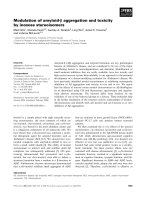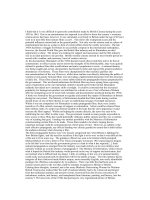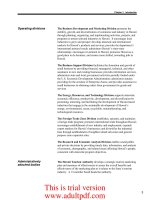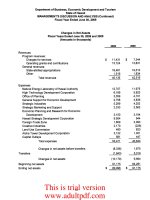combinations of get, right, back, and to
Bạn đang xem bản rút gọn của tài liệu. Xem và tải ngay bản đầy đủ của tài liệu tại đây (195.8 KB, 18 trang )
8. The police acted on a tip that the suspect would be at the bus station on Saturday morning, but he
didn't ________ ________.
9. If you're not careful that crook will ________ you ________ selling him your land for a lot less than
it's worth.
10. Mike used to speak Arabic pretty well, but he ought to ________________ before he goes to
Egypt.
11. How could I have been ________ ________ doing something stupid?
12. The apartment has been cleaned and painted. You can ________ right ________ any time you
want.
13. ________ it ________. I want to see what's on the other side.
14. Living with Sam is driving me crazy — I have to ________ ________.
15. After you make a wish you can ________ ________ the candles.
16. Living in a house with seven dogs is really ________ my cat ________.
49. FOCUS ON: combinations of get, right, back, and to
The focus of this section is an expanded definition of the two-word phrasal verb get to and the
three-word phrasal verb get back to. The purpose is to try to make some sense out of a
seemingly limitless number of idiomatic combinations of get, to, and various particles and
adverbs, in particular right and back, and to demonstrate that many phrasal verbs comprised of
get and a particle are actually variations of get to that can be modified with right andlor back.
Remember that back is sometimes part of a phrasal verb and sometimes an adverb used to
modify a phrasal verb (review Section 26), although we will see that there is often no difference
in meaning between the phrasal verb get back (to), discussed in Section 42, and the phrasal
verb get to modified by back (get back to).
The numbers in the chart correspond with the meanings in the definitions.
get to
1. Although the phrasal verb get to is defined here as meaning arrive, it can be understood
as the basis for some of the phrasal verbs that were discussed in Section 42:
Bill got to Peoria. (Bill arrived in Peoria.)
Bill got back to Peoria. (Bill returned to Peoria.)
Bill got up to Peoria. (Bill arrived in Peoria from the south.)
Bill got down to Peoria. (Bill arrived in Peoria from the north.)
380
Bill got over to Peoria. (Bill arrived in Peoria from the east or west.)
Bill got out to Peoria. (Bill arrived in Peoria from the east or from a
larger city.)
We see that get back (to), get up (to), get down (to), get over (to), and get out (to)
are variations of get to but with additional information. These verbs
can be modified with right, meaning immediately, quickly, or directly (see Section 10):
Bill got right
back to Peoria. (Bill returned to Peoria quickly.)
381
Get to work has two meanings, similar but not the same. Get to work can refer to an
arrival at a place where someone works:
Ann got to work. (Ann arrived at the place where she works.)
But get to work (see meaning 3) can also mean start working, without any
reference to a change of location:
Joe got to work. (Joe started working.)
Joe got back to work. (Joe started working again.)
Joe got right to work. (Joe started working immediately.)
Joe got right back to work. (Joe started working again immediately.)
The difference in these two meanings is illustrated by the following sentence:
l got
to work at 9:00, but I didn't get to work until 10:00, which can paraphrased as I arrived at my
office at 9:00, but I didn't start working until 10:00.
2. Although the phrasal verb get to is defined here as meaning reach a certain level,
number, or amount, it can be understood as the basis for some of the phrasal verbs
discussed in Section 42:
Jane got to 120 pounds.
Jane got back to 120 pounds. (Jane weighs 120 pounds again.)
Jane got up to 120 pounds. (Jane used to weigh less that 120 pounds.)
Jane got down to 120 pounds. Jane used to weigh more that 120 pounds.)
We see that get back (to), get up (to), and get down (to) are variations of get
to but with additional information.
Get up (to) and get down (to) can be modified by back:
Jane got back up to 120 pounds. (Jane used to weigh 120 pounds, lost weight, and
then gained it back.)
Jane got back down to 120 pounds. (Jane used to weigh 120 pounds, gained
weight, and then lost it.)
3. If you start to do something, you get to it:
l'll try to get to my homework after dinner.
If you start to do something, stop doing it, and then later start to do it again, you get
back
to it:
l'll try to get back to my homework after dinner.
If you start to do something, stop doing it, and then later quickly start to do it again,
you get right back to it:
l'll try to get right back
to my homework after dinner.
Remember that when both right and back are used, right always comes first:
I'll try to
get back right to my homework after dinner.
382
get back to
1. Get back to is a three-word verb meaning talk to someone again later. Get
back to does not vary in form — neither back nor to is optional.
Infinitive
present tense -ing form past tense past participle
dog up
clog up & clogs up dogging up clogged up clogged up
1. clog... up p.v. When people or things clog up a drain or something else that liquids must
flow through, they put something in it that prevents water or other liquids from going through
it or that prevents it from working properly.
Don't pour that bacon grease in the sink — you'll clog the drain up.
Dr. Smith said my arteries were so clogged up by plaque deposits that it was a miracle I was
still alive.
clogged up part.adj. When a drain or something else that liquids must flow throughis
clogged up, something is in it that prevents water or other liquids from going through it or
that prevents it from working properly.
The mechanic told me that the engine valves in my car were clogged up.
get ahead
get ahead & gets ahead getting ahead got ahead gottenlgot ahead
1. get ahead p.v. When you get ahead, you become more successful and make progress in
your job or your life.
With your pessimistic attitude, you'll never get ahead.
Getting ahead is pretty easy when your father owns the company.
get back to
get back to & gets back to getting back to got back to gottenlgot back to
1. get back to p.v. When you get back to people, you talk to them later, usually because
you do not have time to talk to them at the time or because you will have information for
them later that you do not have now.
l don't have time to talk now; I'm really busy. Can I get back to you ?
That real estate agent still hasn't gotten back to me to let me know if our offer was accepted.
Infinitive
present tense -ing form past tense past participle
get on
get on & gets on getting on got on gottenlgot on
1. get on p.v. When you move your body toward something and stand, sit, or lie on it,
you get on it.
The nurse asked me to take off my shirt and get on the examination table.
If you get on that chair you can reach the top shelf.
2. get on p.v. When you mount an animal, bicycle, motorcycle, and so on, you get
on it.
Getting on a camel isn't as easy as getting on a horse.
The children got back on their bikes and went home.
3. get on p.v. When you enter a bus, train, airplane, ship, and so on, you get on it.
The bus stopped so that I could get on.
Only people who are going on the cruise can get on the ship.
4. get... on p.v. When you get an item of clothing on, you put it on your body.
Get your coat on. It's cold outside.
These gloves are too small. I can't get them on.
5. get on (with) p.v. When you continue doing something, you get on, get on withwhat
you were doing, or get on with it.
It's getting late. If we're going to finish this work today we'd better get on with it.
I didn't say you could stop! Get on with your work.
get to
get to & gets to getting to got to gottenlgot to
1. get... to p.v. When you get to a place, you arrive there. When you get peopleto a
place, you help them to go there or take them there. When you get to work,you arrive at
the place where you work.
Sarah left her house at 8:30 and got to the beach at 9:15.
When I get to Tokyo, I'll call to let you know I arrived safely.
Frank got fired because he kept getting to work late.
I went to the restaurant across the street for lunch, and I didn't get back to work
until 2:30.
2. get to p.v. When things or people get to a certain level, number, or amount, they
reach it.
lr sure was hot yesterday. It must have gotten to 100 degrees.
When I run, I always try to get to five miles before I quit.
3. get to p.v. When you get to something that you want or need to do, you find the time
to do it. When you get to work, you start working.
l didn't have time to do the ironing last night. I'll try to get to it tonight.
Karen finally got back to her school project yesterday. She hadn't worked on it for weeks.
You've wasted the entire morning. When are you going to get to work?
My boss told me to get off the phone and get back to work.
4. get to p.v. [informal] When you get to doing something, you begin todo it
gradually.
Dad got to thinking that maybe we ought to move to Los Angeles and try to find work there.
384
After seeing all those strange lights in the sky, I got to wondering if maybe UFOs really exist
after all.
5. get to p.v. When you get to do something, you are allowed to do it or are able to
do it.
Timmy was excited because he got to ride a pony.
I hope I get to shake the President's hand after his speech.
6. get to p.v. When something gets to you, it bothers or annoys you, either
psychologically or physically.
Jim's constant complaining is really starting to get to his wife.
Let's sit down and rest — this heat is getting to me.
Infinitive
present tense -ing form past tense past participle
hang on
hang on & hangs on hanging on hung on hung on
1. hang on (to) p.v. When you hang on or hang on to something, you hold it tightly so that
you will not fall or be hurt. Hold on is similar to hang on.
l fell off the horse because I wasn't hanging on tightly enough.
If she'd hung on to my hand, she wouldn't have fallen off the cliff.
2. hang on p.v. [informal] When you hang on, you wait for a short time. Hold on is the
same as hang on.
Hang on for a minute — I'll be right back.
Judy's coming to the phone now — can you hang on?
start off
start off & starts off starting off started off started off
1. start off (withlby) p.v. When an activity or event starts off, it begins. When you start
an activity or event off with something, you begin with it. When you start an activity or
event off by doing something, you begin by doing it.
The singer started the concert off with a song from her latest CD.
Many speakers like to start off a speech by telling a joke.
2. start off p.v. When people or things start off a certain way, they are this way at the
beginning of a process that changes them. Start out is similar to start off.
The day started off nice, but it got cold and cloudy.
I thought the movie was good, but it started off kind of boring.
Infinitive
present tense -ing form past tense past participle
throw away
throw away & throws away
throwing away threw away thrown away
1. throw... away p.v. When you throw something away, you dispose of it by
385
putting it in the wastebasket, trash, and so on. Throw out is the same as throw away.
If you're finished with these papers, throw them away.
Nancy's outside looking in the trash for her wedding ring; it was accidentally
thrown away.
2. throw... away p.v. When you throw away something important or valuable, you
foolishly do something that causes you to lose it.
This is your last chance to save your marriage, so don't throw it away.
When I got mad and quit my job, I threw away a chance to become vice-president of the company.
EXERCISE 49a — Complete the sentences with phrasal verbs from this section.
Be sure the phrasal verbs are in the correct tense.
1. We were lucky that the floodwater didn't ________ ________ the second floor.
2. These steps have ice on them, so ________ ________ to my arm.
3. I usually________________work at 8:40.
4. It's important to ________ your day ________ with a good breakfast.
5. I never used to care about Maria's bad attitude, but now it's starting to ________ ________ me.
6. I'm a little busy now. Give me your phone number, and I'll ________ right________ ________you.
7. Go ________ your shoes ________ — we're leaving in a minute.
8. Ann cut her hair in the bathroom, and she _______ the sink _______ with hair.
9. Don't let the baby ________ ________ the table — he might fall off.
10. If you hadn't ________ ________ the theater late, you wouldn't have missed the beginning of the
movie.
11. ________ ________ all that junk in the garage made a lot more room.
12. As Jerry was _____ _____ the train, he realized that he had forgotten his ticket.
13. Whenever I ________ ________ feeling depressed, I call my mother.
14. If you want to ________________ in this world, you need a good education.
15. The trail to the top of the mountain ________ ________ level, but then it gets steeper and steeper.
386









